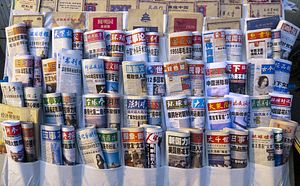Some China-related stories you shouldn’t miss…
David Bandurski, editor at China Media Project, jumps over to ChinaFile this week for an important look at how Beijing uses the media to shape public opinion. Bandurski argues that, rather than outright censorship, Chinese authorities use a more subtle method of guiding public opinion by redirecting or diverting attention – a practice well-steeped in Chinese tradition, but one that faces increasing challenges in the Internet age. Using the example of the recent sinking of the Oriental Star cruise ship, Bandruski explains how this works in action:
First, news was shut off at the source. Next, information flow was moderated through official state media. Finally, with the fountainhead effectively controlled, a tame fountain of information was directed through news outlets across the country, which meant the authorities were able to harness the power of websites and commercial media to get out their own “authoritative” version of the facts.
Bandurski illustrates his point with photographs of newspapers from around China, many of which are strikingly uniform.
Those controls were surprisingly successful this time around – a fact that has worrying connotations for Chinese media. During previous tragedies—the Sichuan earthquake of 2008 and the Wenzhou train crash of 2011—media pushed the boundaries of their coverage, straying from official government narratives. But media controls put in place since Xi Jinping took power seem to be far more effective at silencing China’s journalists.
In another story, one that’s been largely overlooked outside of China, the “China Matters” blog has a fascinating look at reports that the Turkish government has been secretly supplying Uyghurs with travel documents to allow them to leave China. The blog post notes that China recently accused Ankara of providing fake travel documents to would-be Uyghur emigrants – and this after Chinese authorities arrested 10 Turkish citizens in Shanghai in January for allegedly trying to smuggle Uyghurs out of the country. A number of reports suggest that local Turkish diplomats were claiming Chinese Uyghurs as citizens when asked – the question is why and whether the central Turkish government was involved.
Elsewhere, Japan’s The Mainichi reports that Beijing is willing to host Japanese Prime Minister Shinzo Abe this fall – provided three conditions are met: “[T]hat Japan adheres to four political statements jointly issued by Japan and China; follows the spirit of the 1995 statement by then Prime Minister Tomiichi Murayama; and conveys Prime Minister Abe’s intention that he will not visit Yasukuni Shrine.” According to The Mainichi, the message was conveyed during last week’s meeting between Chinese State Councilor Yang Jiechi and Japanese National Security Council chief Shotaro Yachi. Read my coverage of that meeting here.
Xinhua has the welcome news that, two years after China declared “war on pollution,” Beijing’s air is, in fact, getting better. The capital city and surrounding regions saw a 15 percent year-on-year decline in PM2.5 pollution in the first half of 2015.
The Guardian points out that, by an unhappy coincidence, Taylor Swift’s merchandise could run into trouble in China. Her latest album is called “1989” – a sensitive word in China as it’s often taken as a reference to the Tiananmen Square incident of the same year. Other goods on her website feature her initials, “T.S.” (Taylor Swift… or Tiananmen Square). It’s unclear whether China will allow bracelets reading “T.S. 1989” to be sold in China.
Finally, in an update on a previous story, Reuters reports that Tsinghua Unigroup remains hopeful about eventually acquiring U.S. chipmaker Micron, even though their unofficial bid has been dismissed an unfeasible. The U.S. government is widely expected to challenge any such deal.

































